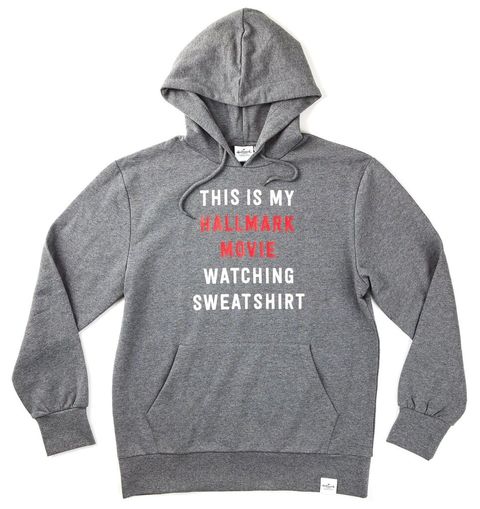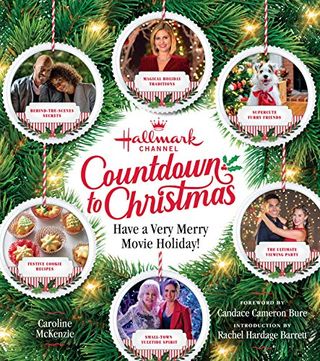The Made-for-TV War for Christmas
A record 70-plus original holiday movies will air (non-stop) on the Hallmark Channel, Lifetime, and newcomer Netflix this holiday season. But when December 26 arrives, which network will reign supreme?

After her panel at the first-ever Christmas Con, a sold out, three-day convention held in New Jersey earlier this month, sponsored by the Hallmark Channel, Lacey Chabert found herself surrounded by a cheerful mob of dedicated fans who religiously watch her fall in love every holiday season. Most wanted autographs or to take a selfie with her. Some asked if she likes to bake in real life, since she’s played both a bakery owner in 2012’s Matchmaker Santa and a struggling pastry chef in 2017’s The Sweetest Christmas. (She does; her favorite thing to make is “Sweet Potato Pie with white sweet potatoes, homemade whipped cream, and a lot of vanilla and vanilla beans—it’s sooo good,” she says.)
But others approached with stories that gave Chabert, who stars in this year’s Christmas in Rome (her eighth such movie for Hallmark), a whole new appreciation for just how much the festive films mean to viewers. “People came up and started crying, telling me how they lost a family member or were going through a difficult health crisis and these movies encouraged and uplifted them,” Chabert says, noting that in many of the photos she took with fans, she herself had tears in her eyes because she was so moved by their stories. “I knew Hallmark has a special way of touching the heart, but I never quite realized how much impact they have on people in a personal way.”
Impact is one word for it; obsession is another. Over the past decade, and especially in the past few years, Christmas movies have evolved from something to put on in the background while you wrap presents, into a full-fledged programming event with networks—principally Hallmark and Lifetime, and increasingly Netflix—squaring off against each other in the race to spread Christmas cheer one sappy, predictable holiday happy ending at a time.
On August 7, Hallmark announced that its 10th annual “Countdown to Christmas,” which includes a record 40 new movies this year, would kick off on October 25. Not to be outdone, two weeks later, Lifetime said its own “It’s a Wonderful Lifetime” slate of 30 original movies would also begin airing on October 25. Take that, Hallmark. And Halloween.
There’s dueling merchandise (Hallmark sells a “This Is My Hallmark Movie Watching Sweatshirt” sweatshirt, while Lifetime offers an “All I Want for Christmas is My Lifetime Movies” long sleeve tee). And fierce competition for talent—Sister, Sisters’ Tamera Mowry-Housley stars in Hallmark’s A Christmas Miracle; over at Lifetime, her twin, Tia Mowry-Hardrict is in A Very Vintage Christmas—as well as for filmmakers: Director Monika Mitchell, who has made four holiday movies for Hallmark since 2016, decamped to Netflix this year to film The Knight Before Christmas. Hallmark and Netflix both have films called Let It Snow, and all three have their own take on how royals find love at the holidays: Hallmark’s 2014 A Royal Christmas, and Lifetime’s My Christmas Prince and Netflix’s A Christmas Prince, both released in 2017.
“It’s no secret—we certainly track each other,” says Meghan Hooper, Lifetime’s senior vice president of original co-productions and acquisitions. “We’re all after the same audience and we all want to have the most or be first—everyone is planting their flag.” But, she adds, the fact that Lifetime received its highest ratings ever last year, while movies on Hallmark and Netflix also surged in popularity, shows “there’s room for everyone to win.”
Her competition isn’t as magnanimous. Hallmark’s executive vice president of programming, Michelle Vicary, has declared that the channel “owns” the holiday—and she has the numbers to prove it. Last year, with 85 million viewers, Hallmark was the highest-rated and most-watched cable network (excluding news and sports) among women ages 18 to 54 for the fourth quarter. Its app, Hallmark Movie Checklist, introduced in October 2018, has been downloaded 1.5 million times, including by 400,000 people in the two months leading up to this year’s Countdown to Christmas. It allows users to set reminders so they never miss a flick; 32 million have been set thus far. (Elisabeth Moss has the Hallmark app and told Entertainment Weekly she watches “as many as possible” each Christmas; she also said she’d like to star in one.)
Get exclusive access to fashion and beauty trends, hot-off-the-press celebrity news, and more.
This year, Hallmark is on pace to win the season again. As of November 19, they had already brought in more than 35 million viewers. “The numbers speak for themselves,” Vicary says, when asked if she’s worried about Lifetime and Netflix encroaching on Hallmark’s turf. “What we do is different than our competitors because we have the luxury of a 110-year-old American brand—one of the most iconic in history. There’s a lot of dark, edgy content out there but what we do is really unique because we embrace what our brand is and create an experience that people come to us for.”
Tia Mowry-Hardrict in Lifetime’s A Very Vintage Christmas (top). Tamara Mowry-Housley in Hallmark’s A Christmas Miracle (bottom).
Hallmark started making holiday films not long after launching the channel in 2001, but it was the popularity of 2006’s The Christmas Card, about a soldier in Afghanistan who tracks down the woman who sent him an anonymous card (obviously they fall in love), that inspired the launch of Countdown to Christmas in 2009. “We really give the people what they want,” Vicary says. “They’re looking for an experience from Hallmark that is positive, that is emotionally connective, and that makes them feel a little bit better about the world.” She keeps the channel playing in her office all day every day. “Sometimes people will come in and ask me a question and I’ll be like, ‘Shhhh, here’s the next movie,’” she says. “You have to love them if you’re going to make 40 of them.”
To produce that much original content annually, Hallmark works on Christmas movies all year long, taking only the day itself, December 25, off. Most of the films are shot in just 15 days. The finishing touches are still being put on some of this year’s movies, and they are already in preproduction for the 2020 slate, some of which will be shot on location during this year’s holidays.
Lifetime is taking notes. The network has been making Christmas flicks since the late ’90s, before the Hallmark Channel existed. “We’ve been doing this longer than a lot of other networks,” Hooper says. “We pride ourselves on that.” And It’s a Wonderful Lifetime has been around since 2012, but the network’s holiday offerings were nowhere close to matching Hallmark’s until this season. They might have introduced 30 original movies for 2019, but before 2018, they made fewer than 10 a year.
In December 2018, Lifetime’s primetime ratings increased by 29 percent over December 2017, giving the network its strongest month of growth in more than 17 years. After that success, “We decided to go big,” Hooper says. They brought in a bevy of creatives, writers, and producers who generated more than 500 ideas, which were whittled down to the 30 films Lifetime will premiere this year, more than double last year’s slate of 14. They also decided to air them 24/7 for two months leading up to the holiday, moving their premiere date up by nearly a month, from November 21 last year to match Hallmark’s pre-Halloween launch this year. “A total coincidence,” Hooper says sarcastically, adding that Lifetime “pays close attention” to its competitors.
When it comes to the competition, the big red elephant in the room is Netflix, which is rolling out six original holiday flicks this year, along with several holiday-themed series, like a holiday edition of its popular Great British Baking Show, as well as a few animated movies for kids. When I first called Netflix to schedule interviews, a publicist demurred upon learning Hallmark and Lifetime would also be in the story. “We make films, they make made-for-TV movies,” she said. "What sets us apart is the range of programming we're providing - our holiday offerings include a wide range of films, both live action and animated, as well as series, and holiday specials." One of these films, Knight Before Christmas about a medieval knight who is transported to the present day and falls in love with a high school science teacher played by Vanessa Hudgens, premiered on the platform on November 21.
“[Netflix] can call them what they want to, but they’re the same,” says Lifetime’s Hooper. “It doesn’t bother me if Netflix wants to spin them in a slightly different way, but I don’t think the audience is looking for a spin—they love the movies as they are.” Hooper acknowledges that some Netflix films “certainly have a higher budget,” pointing to last year’s The Christmas Chronicles starring Kurt Russell, which had 20 million views in its first week. (At a conference last year, Netflix chief content officer Ted Sarandos said the movie had the “most impact” of any in Russell’s career because the Tombstone star had “never had that many people see one of his movies in the first week ever.”)
Netflix declined to make an executive available for an interview and famously does not release viewership numbers, but said TV networks should not worry about them encroaching. “They do that stuff really well and we’re really not trying to tread on their toes—we have a very different set of things we’re offering,” the spokeswoman says.
The platform upped its number of original Christmas movies after the success of The Christmas Chronicles last year and also 2017’s runaway hit A Christmas Prince, which it chided viewers for watching so much, tweeting, “To the 53 people who’ve watched A Christmas Prince every day for the past 18 days: Who hurt you?” But it is also indulging them: A third installment, A Christmas Prince: The Royal Baby premieres on December 5.
The first of the streaming giant’s offerings to debut this year, Holiday in the Wild, starring Kristin Davis, Rob Lowe, and orphaned baby elephants, doesn’t feel that distinct from Lifetime and Hallmark movies. There are cheesy lines (Rob Lowe says, “Some say buffalo are the most dangerous animal out here, but that’s not true—we are”), a woman finding herself after heartbreak (a common theme in all made-for-TV movies), and, of course, a happy ending. But the film’s higher budget and production value are apparent.
Rob Lowe and Kristin Davis star in Holiday in the Wild on Netflix.
Davis, who has long advocated for protecting elephants from poachers, says she wanted to make the movie for years. “I wanted to raise awareness about poaching for people who weren’t animal fanatics watching National Geographic like me,” she says. She found a home at Netflix, which was willing to spend the time and money to film on location in South Africa and in Zambia at an actual elephant orphanage. They used real elephants, not trained animals as in other movies, which are more difficult to work with, but also more ethical. “I needed a partner who knew it was going to be hard and who understood why we needed to do it that way,” Davis says.
Monika Mitchell, who has made four Hallmark movies and directed Netflix’s Knight Before Christmas this year, has felt a palpable difference between the two networks. “At Hallmark, they have such a strong brand and a clear set of requirements that their audience is expecting, so it feels more serialized,” Mitchell says. “As a director, you’re folding yourself into the project rather than making it your own.” She also only worked on her Hallmark films for two to three months, while Knight took all year. “Both experiences are amazing,” says Mitchell, who may have been predestined to make such films, having been born on Christmas Eve. “But the expectations are different. The amount of time and level of detail they require from me are not the same.”
Starring in a Christmas film once may have been a sign of a career on the decline, but now, thanks to the movies’ popularity, such gigs are coveted. “It’s an easy call to make to ask actors if they would like to be in the number one movie in the time slot on Saturday night against all other competition,” Hallmark’s Vicary says. “It’s not a hard ask.”
Lifetime has distinguished itself by having more people of color among its casts. “When I first started making Christmas movies, the place to see diversity was Lifetime,” says Tatyana Ali, who has made four movies for the network. In 2013, when she starred in her first for Lifetime, Dear Secret Santa, she “wasn’t invited anywhere else,” Ali says. “I’m not sure if [diversity] was a mandate, but I’m sure it was done on purpose because you could see Lifetime was not just casting minorities as guest stars or secondary characters, but as the leads.” Last year’s Jingle Belle, wherein Ali starred as a woman named Belle who writes jingles, had a majority black cast. “Representation is good business,” Ali says. “Women of color are watching, and we buy a lot of stuff, so there’s plenty of reasons for networks and advertisers to cater to us.”
Tatyana Ali stars in Christmas Everlasting on Lifetime.
Ali says she’d next like to see diversity being factored into the subject matter of the films, too. “My characters have always gone back to these small towns that feel midwestern, not totally rural, but definitely not the city,” she says. “As these stories open up and include more people of color, it’d be fun to see those things get flipped because for a lot of people, the city is home.”
With Hallmark and others looking to add more diversity, Ali is in high demand—she starred in movies for both Lifetime and Hallmark last year. But she's also sought after because of her previous role as Ashley Banks, Will Smith’s cousin on The Fresh Prince of Bel Air.
Networks purposefully cast stars who their viewers grew up watching to add to the warm fuzzy vibes. “It took me a couple of years to figure out why they keep using me,” says Danica McKellar, who played Winnie Cooper on The Wonder Years and who will star in her fifth Hallmark film this year. “Then it hit me how many people have said to me, ‘You are a part of my childhood.’ These movies bring on a really beautiful nostalgia and part of that is watching these actors that we watched when we were kids.” She says now she’s recognized on the street more for her Hallmark movies than The Wonder Years.
When she was first cast, Hallmark executives promised McKeller they would always stay true to that nostalgia spirit. “They said, ‘Danica, so many people will have a brand and then they try to change things or go edgier, and we’re never going to do that. We know who we are, we love who we are, and we’re not going to change,’ and it was the most wonderful thing to hear,” McKellar says. Her film this year, Christmas at Dollywood, was her idea—she calls it a “love letter to Dolly Parton,” who makes a cameo, and says it’s full of reminders that Christmas is the time to reconnect with loved ones and holiday rituals. “The word ‘tradition’ is in every Hallmark movie script at least three times,” McKellar says with a laugh. “We’re not just providing entertainment, we’re also providing a service to people. We’re telling them to make their own holiday traditions and giving them all these ideas on how they can do that: You can make ornaments, have hot cocoa, and hang out by the fire, or make a snowman together—there are so many ways you can reconnect with your family over the holidays.”
Vanessa Lachey confirms that’s what Lifetime is going for as well. “The holidays are when your life status really hits you, family and financial issues arise, so it helps to turn on a movie and say, ‘Hey, look, we’re all going to get through this together,’” she says. “That’s what the holidays are all about and it’s a tried-and-true formula for these movies so obviously we’re going to stick with it.” Lachey—who is obsessed with Christmas movies to the point that she and her husband, Nick, recreated the “All You Need Is Love” wedding moment from Love Actually when they married in 2011—says the characters and storylines draw viewers with their relatability. “The thing about Lifetime movies is, the woman is just like you,” says Lachey, who has starred in two such holiday movies, this year’s Christmas Unleashed, and 2018’s A Twist of Christmas. “She’s working or she’s a stay at home mom, she’s widowed, she’s divorced, or she’s never found love. All of these life situations are very real and we try to give people positive ways to overcome these obstacles and get their happy ending.”
And if that’s not enough, add puppies. “There’s a picture on my phone of my costar holding two puppies and smiling,” Lachey says of Christopher Russell who plays Lachey’s ex-boyfriend in Christmas Unleashed, premiering December 7. “And I was like, ‘That’s the movie poster—you and puppies.’ Literally every woman in America will watch a movie if there’s a guy and puppies. I mean, how could you go wrong?” If her prediction about the success of Unleashed is correct, then rest assured that next year, puppies will feature front-and-center at Hallmark and Netflix too.
This post has been updated.
Kayla Webley Adler is the Deputy Editor of ELLE magazine. She edits cover stories, profiles, and narrative features on politics, culture, crime, and social trends. Previously, she worked as the Features Director at Marie Claire magazine and as a Staff Writer at TIME magazine.



